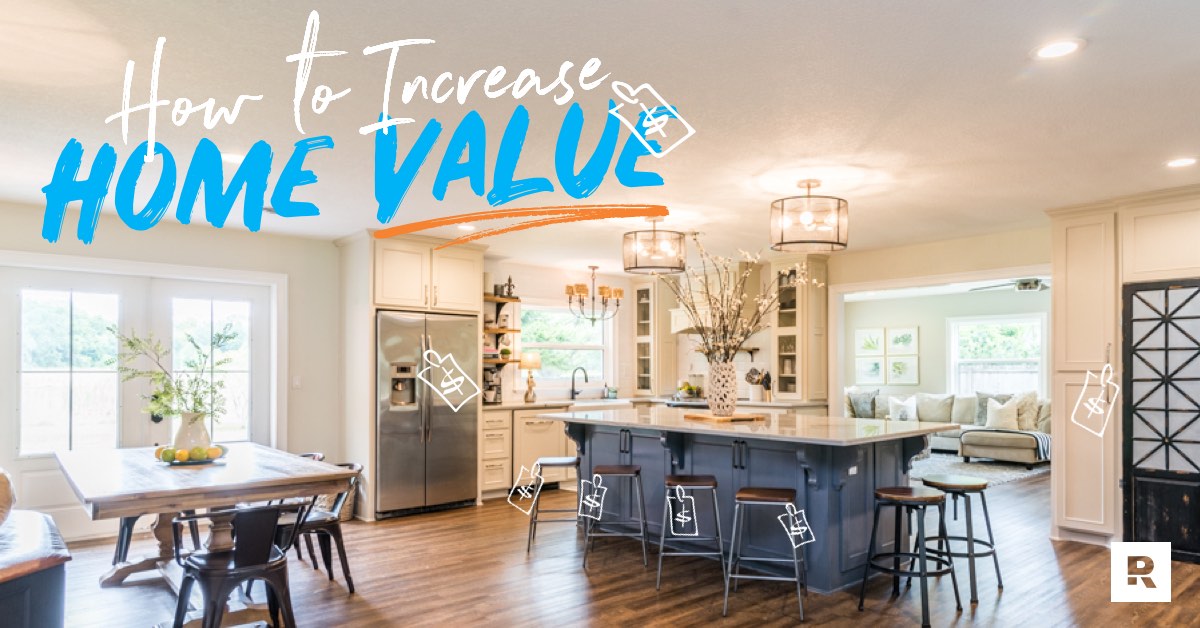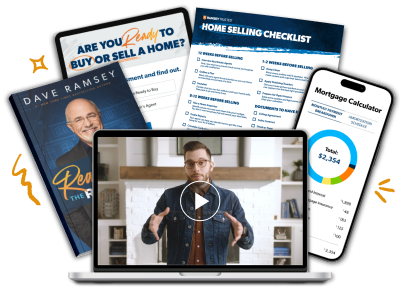
As a smart homeowner, you probably see your home as not only a place to do life, but also as one of the best ways to build wealth through home equity. In fact, thanks to the magic of home appreciation, which is when property value increases on its own, recent sellers sold their homes for a median of $55,000 (29%) more than they purchased it!1
Unfortunately, it’s hard to predict a home’s exact rate of appreciation since that’s based on things that are always changing, like: how many buyers are looking for homes, how many homes are available, and inflation. And who knows if you’ll even be ready to sell your home when the market is hot? For instance, most recent buyers think they’ll live in their home for 15 years. But recent sellers lived in their homes for a median of nine years.2
Find expert agents to help you sell your home.
Is it possible to increase home value beyond the standard equity appreciation? You betcha. If you want more confidence that your home will be worth top dollar someday, just follow these simple tips on how to increase home value.
Let’s dive in!
1. Add Beauty
Okay, the first thing you can do to increase home value is to make your home more attractive—literally. That’s right, all you home decor lovers, we’re talking about home staging! And, while making your home more beautiful is definitely a great selling point for future buyers, you’ll also get to enjoy living in a prettier home yourself.
Do home-staging techniques really increase value? Let’s see what the pros think: Recently, 22% of sellers’ agents said staging a home increased the dollar value offered by buyers 1–5% compared to similar homes. And 17% said it increased value by 6–10%.3 So, if your home is worth $300,000, there’s a chance that following typical home-staging tips could help boost your home's value by $3,000–30,000.
With that said, don’t go crazy and blow a bazillion dollars on projects for the sole reason of increasing home value. Instead, if you know you’ll personally enjoy the changes you make to your home, even if they don’t bump up home value—that’s still a win.
If you do decide to spruce up the place, which room should you remodel? Here are the most common rooms homeowners recently staged:4
- Living room (93%)
- Kitchen (84%)
- Master bedroom (78%)
- Dining room (72%)
We can use the kitchen as an example of how adding beauty can increase home value. A minor kitchen remodel costs nearly $23,000. That includes things like updating appliances, cabinets, countertops, sinks and flooring. This project tends to regain more than 80% of what was spent, which means you might add more than $18,000 to your home’s value.5 Not too shabby.Now, what about the outside of your home? That’s right—you can also increase value by giving your home curb appeal! Here are some cost and return averages on those types of projects:6
|
Project |
Job Cost |
Cost Recovered ($) |
Cost Recovered (%) |
|
Siding replacement |
$16,036 |
$12,119 |
76% |
|
Deck addition (wood) |
$13,333 |
$10,083 |
76% |
|
Manufactured stone veneer |
$8,907 |
$8,449 |
95% |
|
Grand entrance (fiberglass) |
$8,994 |
$6,469 |
72% |
For more confidence on what project to spend your money on, ask a local real estate agent which features are helping homes sell for more in your area.
2. Add More Space
Bigger homes tend to sell for more money. That may seem like an obvious point to make but stay with us. The recent median price for the size of a home is nearly $200 per square foot.7 And that amount held steady for small and large homes. So adding square feet can add real value!
Take a look around. Could you knock out some walls and open up space to make the place feel bigger? Is there any spot in your house where having another bathroom would make things a hundred times easier?
Just remember that home renovations tend to cost you more than the resale value. For example, say you want to do a midrange bathroom addition with a fairly nice sink, shower and toilet. Doing that could add almost $29,000 to your home’s value. But getting the project done could cost you nearly $48,000. So, you probably won’t earn back all the money you spent. But that’s still more than a 60% return, which isn’t too bad if you plan to live in the home for a while to enjoy the new addition.8 You just want to make sure the space you add to boost home value is worth it to you and your budget.
Using the example above, suppose you have a $200,000 home and you save up $48,000 to add a bathroom. According to the data, your home would then be worth $229,000. But if you sold it soon after that, you would lose $19,000. Instead, you’d want to stay in your home until it appreciates enough to make up for the loss. And that’s tricky to predict. Although, even recent sellers who lived in their homes for eight to 10 years made $35,000 (17%) more on their home than what they paid for it.9 So if you lived in your home for around that long and sold during similar market conditions, you might earn back almost double the loss of the $19,000!
Want More Expert Real Estate Advice?
Sign up for our newsletter! It’s packed with practical tips to help you tackle the housing market and buy or sell your home with confidence—delivered straight to your inbox twice a month!
3. Add Energy Efficiency
Okay, you might think adding energy efficiency isn’t the most exciting way to increase home value. And let’s face it, you’d be right. But hey, if it increases home value, then that’s why we’re here. Besides, almost 70% of real estate professionals said that promoting energy efficiency in home listings was valuable.10
So which energy efficiencies should you focus on to build home value? Well, recent homebuyers found these environmentally friendly features to be most important:11
- Heat and cooling costs (33%)
- Windows, doors and siding installations (29%)
- Energy-efficient lighting (23%)
- Energy-efficient appliances (21%)
- Landscaping for energy conservation (10%)
- Solar panels installed on home (3%)
Let’s say you upgrade around 10 of your home’s windows to be more energy efficient. If you went with a vinyl window replacement, that could put you just under $17,000 in the hole. But the value of the windows would likely earn you more than a 70% return on what you spent, which means your home value might increase by more than $12,000.12 Plus, you’ll save money on utility bills!
4. Add Updated Systems and Appliances
Easing a buyer’s mind about home maintenance issues is another way to present your home as more valuable. How do you do that? Make sure all the systems and appliances in your home are up to date and fully functional. Take a look around the house. If the air conditioner keeps making a clanking sound, solve it. If a plumbing line is leaking, fix it. If the water heater is older than dirt, get a new one. If the roof has seen better days, get it replaced. A midrange roofing replacement with asphalt shingles might cost a little more than $22,000. But the numbers show it can boost your home's value by more than $15,000—that’s over a 68% return on your investment!13
5. Add Technology
If you’re a tech geek, then you’re going to like this one. Americans are getting more interested in buying homes that come with gizmos and gadgets. In fact, a recent survey found out which smart home products homebuyers most preferred to have preinstalled if they were to buy a home in the next year:14
- Smart thermostats: 77%
- Smart fire detectors: 75%
- Smart carbon monoxide detectors: 70%
- Smart camera: 66%
- Smart lock: 63%
- Smart lighting system: 63%
So, switch on your tech-geek radar whenever you hit the electronics store. Who knows, you might find a deal to upgrade your home with smart technology!
How Should I Pay for Projects That Increase Home Value?
You probably noticed that many of these projects cost tens of thousands of dollars. So, how in the world do you pay for them? The answer is: with cash!
Don’t get suckered into thinking that financing a project is the more sophisticated way to go. Borrowing money to fix up your home is never a good idea, despite what your broke friends might tell you. As we learned earlier, most home projects don’t even earn back what it costs to get them done. So make sure you avoid lousy financing options like credit cards and home equity lines of credit (HELOC).
Tip: If paying for home projects without borrowing money sounds impossible, you may need to get serious about a plan for extra cash flow. Don’t worry—that can be solved by making a few tweaks to your income. Here are the best ways to find extra money:
If you use some of these ideas, you may be surprised by how much money is freed up to go toward your monthly savings fund for home upgrades.
Want More Home Value Tips?
Now you’ve got the best ways to increase home value and how to pay for them in your tool belt. But if you want even more confidence to get the highest value for your home when it’s time to sell, especially if you’re planning to sell soon, get advice from a real estate agent in your area. To easily find an agent who won’t pressure you to do things their way, try our RamseyTrusted® program. We only recommend agents who care about your financial goals and know how to help you get the most value for your home.
Did you find this article helpful? Share it!

We Hear You!
We’re considering adding the ability to save articles to your Ramsey account.




